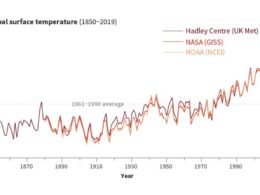The Health Strategist blog
by Joaquim Cardoso, MSc
October 11th, 2021
Image: epha
This is a brief post, based on the article below, about the “COP26 Special Report on Climate Change and Health” on the bottom of this post.
Key messages:
The burning of fossil fuels is killing us
Reducing climate change could save 5.6 million lives annually from air pollution-related deaths
The report zeroes into more detail on four key areas of action:
- Healthier energy systems;
- ‘Reimaginging’ urban environments, transport and mobility — a major source of climate emissions and air pollution in cities;
- Promoting healthy, sustainable food systems that deliver more nutritious diets with a smaller carbon footprint than current meat- and processed food heavy diets.
- Protecting and restoring natural biodiversity, which is essential to the regeneration of clean water, clean air and food production systems.
REFERENCE ARTICLE
______________________________________________________________
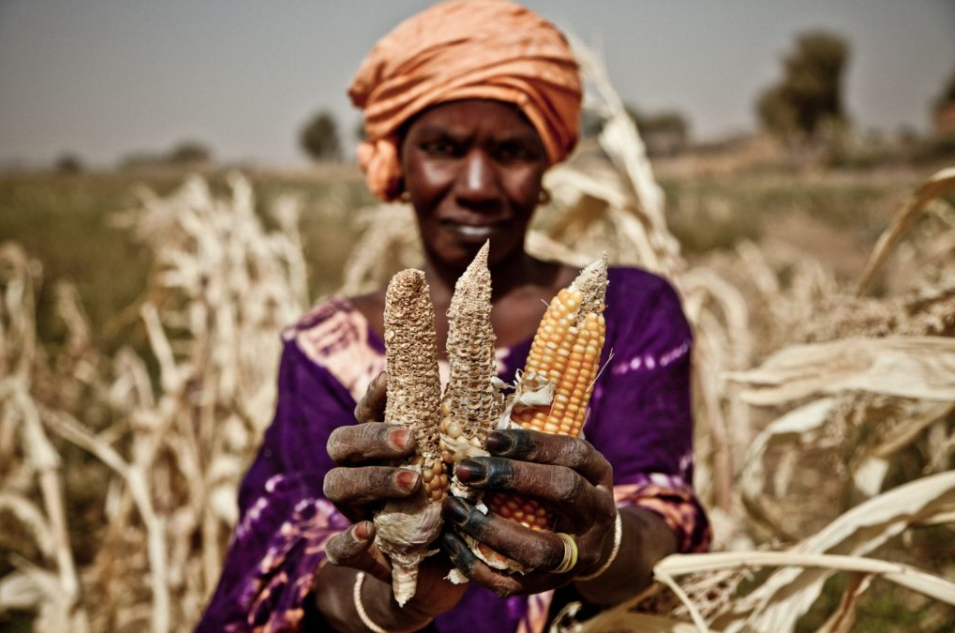
“Burning Of Fossil Fuels Is Killing Us’ — Declares New WHO Climate And Health Report
Health Policy Watch
Elaine Ruth Fletcher
11/10/2021
Image: A woman in Africa’s Sahel region shows how her maize corn ears have dried up in a drought, which are occuring with greater frequency in the world’s most food insecure regions as a result of climate change.
A sweeping World Health Organization report on Climate and Health , published just ahead of a critical Glasgow climate conference (COP 26) that begins 31 October, has declared that “the burning of fossil fuels is killing us” — the bluntest denunciation to date by the global health agency of societies’ fossil fuel addiction.
“Climate change is the single biggest health threat facing humanity,” adds the report, whose publication was accompanied by an open appeal to governments, signed by some 300 health organizations representing 45 million health workers worldwide — two-thirds of the global health workforce.
Climate change is the single biggest health threat facing humanity
The “COP26 Special Report on Climate Change and Health” provides little in the way of brand-new data on a much-discussed issue.
But it is the boldest yet of WHO’s recent statements on increasingly alarming trends — leading to more extreme heat episodes, fires, floods, and droughts, and air pollution — which in turn create a cascade of health effects.
“There are 45 million plus health care professionals who are witnesses to the health emergency that is unfolding in plain sight,” said Howard Catton, CEO of the International Council of Nurses.

“They see and work with young … and old people struggling with respiratory disorders caused or exacerbated by poor air quality and pollution… people with heatstroke, exhaustion and hypothermia,” said Howard Catton, CEO of the International Council of Nurses, which played a major role in mustering the health community to its appeal for action.
“They support people who are not coping with extreme temperature changes from heat stroke and exhaustion to hypothermia….
“And they see and experience extreme events and disasters like flooding and forest fires which resulted from spreading infectious diseases, including vector borne diseases, the contamination of food and water that people can’t avoid.
“They see that the impact is not just on people’s physical health, but on their mental health, depression, anxiety, grief, isolation symptoms of post traumatic stress disorder,” he added.
“The planet has become the patient.”
“The planet has become the patient.”
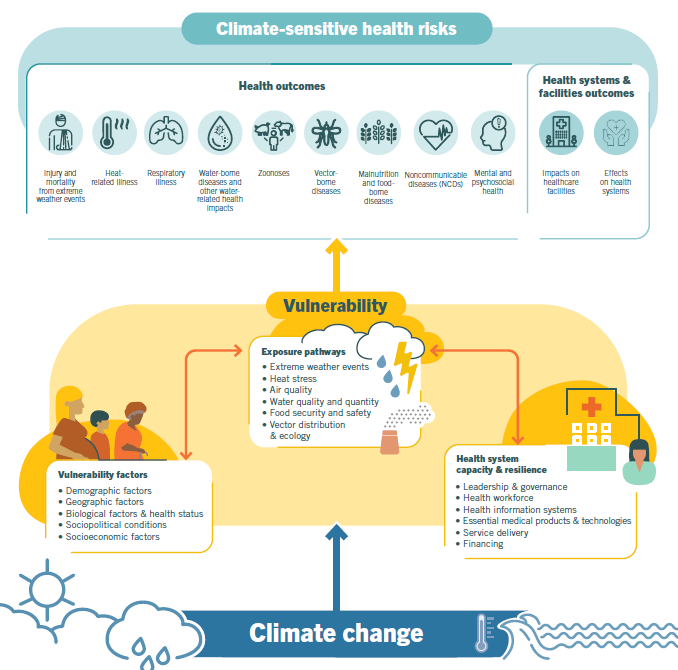
Reducing climate change could save 5.6 million lives annually from air pollution-related deaths
Despite its harsh tone, the report provides no new estimate for how many lives a year are being lost to climate change directly, said Dr Diarmid Campbell-Lendrum, one of the leaders of the report.
He acknowledged that the most recent WHO study estimated projected deaths from climate change at around 230,000 people a year by the year 2030 — which admittedly only looked at a “small proportion of the ways in climate change affects health,” — omitting a critical issue, the impacts of extreme heat on health.
Even so, dramatically reducing the burning of fossil fuels, as well as domestic burning of wood and biomass for cooking and heating, would slash deaths from air pollution by 80%, saving some 5.6 million lives a year, said Dr Maria Neira, Director of WHO’s Department of Environment, Climate and Health, which coordinated the report.
… dramatically reducing the burning of fossil fuels, as well as domestic burning of wood and biomass for cooking and heating, would slash deaths from air pollution by 80%, saving some 5.6 million lives a year,
“One of the things that has become very clear in the past few years is this compounding nature of the climate crisis,” added Campbell-Lendrum referring to the synergies. “We have increasing extreme heat also combining with other vulnerability factors. We have urbanizing populations, we have older populations, we have populations living with other previous [health] conditions.”
And while the most heavy health burden from climate change tends falls upon people living in low- and middle-income countries whose homes, food security and livelihoods are more directly impacted by more extreme weather, people in high-income countries are feeling, more and more, the impacts of climate-related drought, fires and flooding, and extreme heat — as evidenced by the wildfires, flooding and heat extremes, seen over the past two years in countries ranging from Australia, to Germany and the United States.
… Populations that we thought were relatively immune from climate change, those living in developed countries are in fact much more vulnerable than we thought, including to things like heat stress,” Campbell-Lendrum said.
Template for Action

Billed as a template for action in 10 critical areas — from healthier cities to healthier energy supplies — the report strikes a forward-looking note, citing the solutions available if only sufficient money and political are invested in the climate issue.
The report zeroes into more detail on four key areas of action:
- Healthier energy systems;
- ‘Reimaginging’ urban environments, transport and mobility — a major source of climate emissions and air pollution in cities;
- Promoting healthy, sustainable food systems that deliver more nutritious diets with a smaller carbon footprint than current meat- and processed food heavy diets.
- Protecting and restoring natural biodiversity, which is essential to the regeneration of clean water, clean air and food production systems.
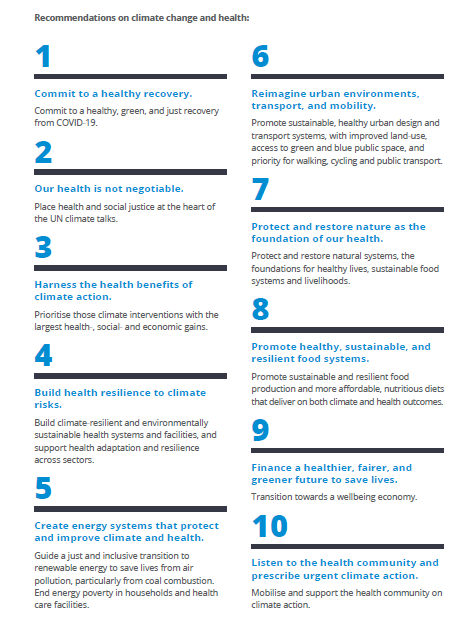
The emphasis, said Neira, should be on the positive benefits that can be generated for people with the right set of climate actions.
“The positive message on the health argument is that whatever you do to tackle the causes of climate change will have enormous benefit for the health of the people,” Neira pointed out.
“ This report shows that there are ways to limit climate change that can also improve our wellbeing,” agreed Cheryl Moore, Director of Research Programmes at Wellcome Trust, which has made climate change one of its premier strategic priorities:
“We’ve spent too long thinking about these issues in isolation; now is the time to focus our efforts on a global, unified strategy to safeguard human health, and that of the planet. It will require all of us working together — now and for the decades to come.”
Greening the health sector
The report also calls upon the health sector to start greening its own backyard — by creating more sustainable and climate resilient health facilities.
“If the health sector was a country it would be the fifth largest climate emitter in the world,” declared Neira, referring to the very high carbon footprint of health facilities in most developed countries — second only to the leisure industry in terms of building energy and water demand.
The same facilities are also major generators of plastic and other types of waste from the use of single use health products — often unavoidable. At the same time, facilities in low- and middle-income countries may lack adequate access to electricity and safe water supplies for hygiene and basic health care operations, like maternal and newborn delivery. And extreme heat in poorly designed and ventilated health facilities can also be a huge risk for newborns — particularly premature babies — whose physiology does not regulate temperature well.
Image Credits: Commons Wikimedia, Pablo Tosco/Oxfam, WHO, Planetary
Health Eastern Africa Hub, WHO/Bill & Melinda Gates Foundation.
Names mentioned:
- Dr Tedros Adhanom Ghebreyesus Director-General World Health Organization
- Nigel Topping COP26 High-Level Climate Action Champion
- Howard Catton, CEO of the International Council of Nurses.
- Dr Diarmid Campbell-Lendrum, one of the leaders of the report
- Dr. Maria Neira, Director of WHO Environment, Climate Change and Health
- Cheryl Moore, Director of Research Programmes at Wellcome Trust
Originally published at https://healthpolicy-watch.org.
ORIGINAL REPORT
______________________________________________________________
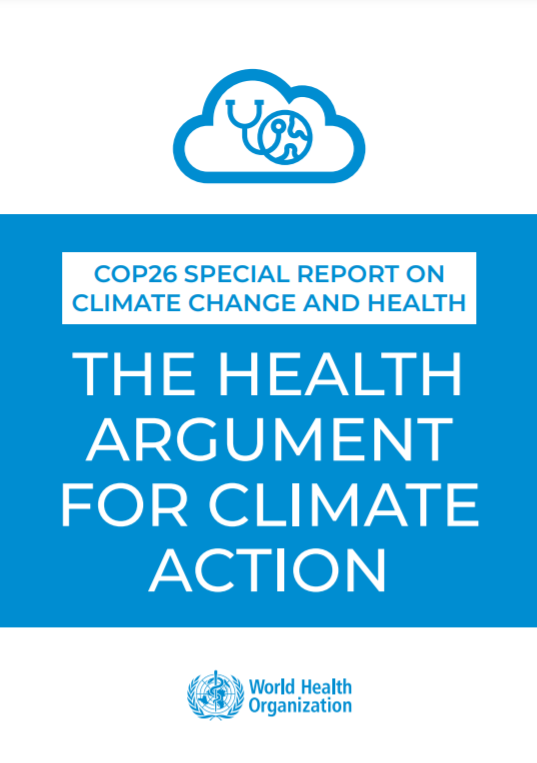
Suggested citation.
COP26 special report on climate change and health: the health argument for climate action. Geneva: World Health Organization; 2021. Licence: CC BY-NC-SA 3.0 IGO.COP26 Special Report on Climate Change and Health
The Health Argument for Climate Action. The 10 recommendations in the COP26 Special Report on Climate Change and Health…www.who.int






